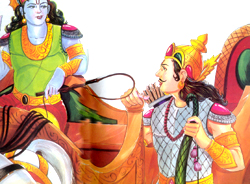
In the beginning of creation, the Lord of all creatures sent forth generations of men and demigods, along with sacrifices for Vishnu, and blessed them by saying, "Be thou happy by this yajna [sacrifice] because its performance will bestow upon you all desirable things."
The demigods, being pleased by sacrifices, will also please you; thus nourishing one another, there will reign general prosperity for all.
In charge of the various necessities of life, the demigods, being satisfied by the performance of yajna [sacrifice], supply all necessities to man. But he who enjoys these gifts, without offering them to the sages in return, is certainly a thief.
The devotees of the Lord are released from all kinds of sins because they eat food, which is offered first for sacrifice. Others, who prepare food for personal sense enjoyment, verily eat only sin.
All living bodies subsist on food grains, which are produced from rains. Rains are produced by performance of yajana [sacrifice], and yajna is born of prescribed duties.
Regulated activities are prescribed in the Vedas, and the Vedas are directly manifested from the Supreme Personality of Godhead. Consequently the all-pervading Transcendence is eternally situated in acts of sacrifice.
My dear Arjuna, a man who does not follow this prescribed Vedic system of sacrifice certainly leads a life of sin, for a person delighting only in the senses lives in vain.
One who is, however, taking pleasure in the self, who is illuminated in the self who rejoices in and is satisfied with the self only, fully satiated-for him there is no duty.
A self-realized man has no purpose to fulfill in the discharge of his prescribed duties, nor has he any reason not to perform such work. Nor has he any need to depend on any other living being.
Therefore, without being attached to the fruits of activities, one should act as a matter of duty; for by working without attachment, one attains the Supreme.
Even kings like Janaka and others attained the perfectional stage by performance of prescribed duties. Therefore, just for the sake of educating people as a leader, you should perform your work.
Whatever action is performed by a great man, common men follow in his footsteps. And whatever standards he sets by exemplary acts, the entire world pursues.
O son of Partha, there is no work prescribed for Me within all the three planetary systems. Nor am I in want of anything, nor have I need obtain in anything--and yet I am engaged in work. | |